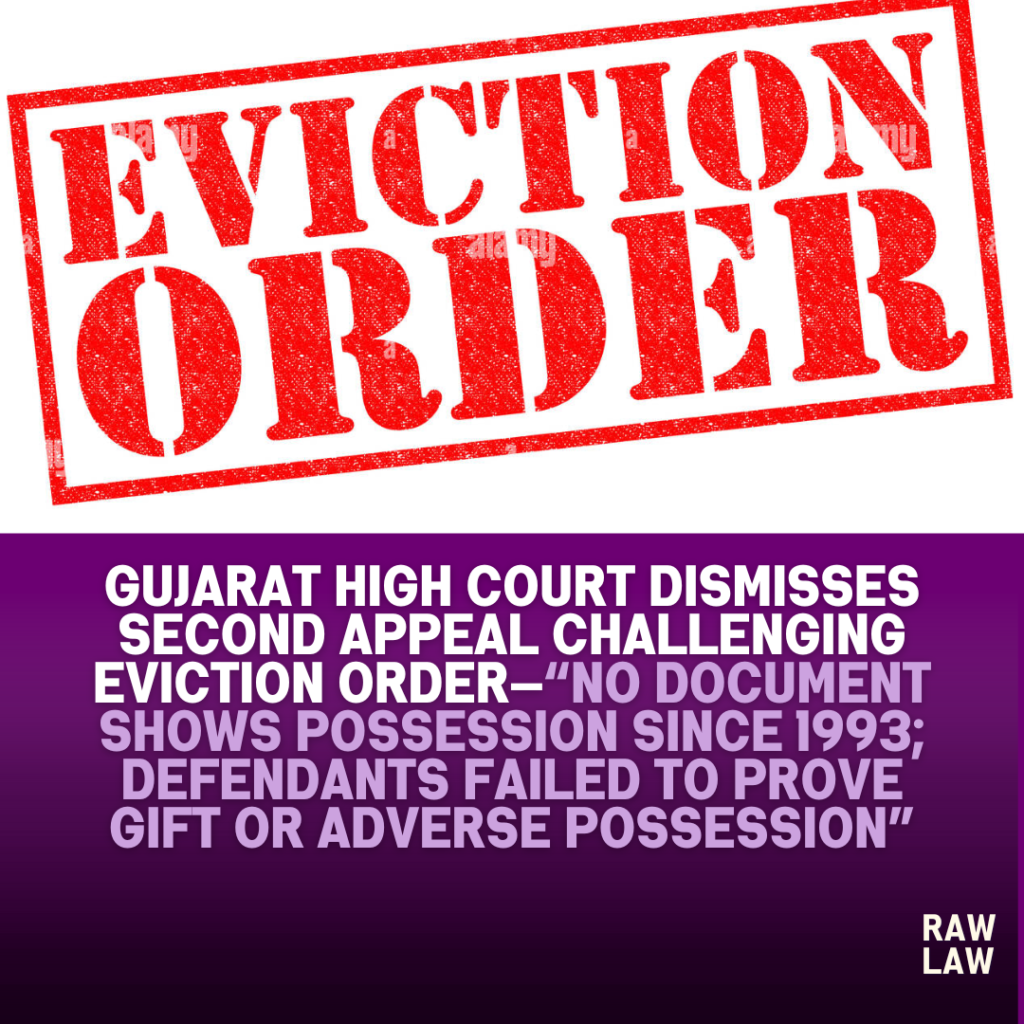Court’s Decision
In a judgment dated 12 June 2025, the Gujarat High Court dismissed the Second Appeal filed under Section 100 CPC by a public charitable trust and its trustees challenging the concurrent findings of the Trial Court and the First Appellate Court directing them to hand over possession of the disputed land. The Court found that the appellants failed to establish their claim of possession by virtue of a gift deed or adverse possession and ruled that no substantial question of law arose for consideration. However, it granted a 30-day stay on the implementation of the judgment.
Facts
The plaintiffs (respondents in appeal) filed a suit in 2008 seeking a declaration that they are the owners of the suit property and for a direction to the defendants (appellants) to hand over peaceful and vacant possession. The plaintiffs contended that the appellants had trespassed onto the suit property only in February 2008.
The defendants claimed that they had been in possession of the suit land since 1993 through an oral gift from the plaintiffs’ forefathers and had also acquired title by adverse possession. Both the Trial Court and the First Appellate Court rejected the defendants’ claims and decreed the suit in favour of the plaintiffs.
Issues
- Whether the defendants were in possession of the suit land since 1993?
- Whether the defendants acquired ownership by adverse possession?
- Whether the suit was barred under the Gujarat Public Trusts Act for want of permission from the Charity Commissioner?
- Whether there was a failure by the First Appellate Court to comply with Order XLI Rule 31 CPC?
- Whether substantial questions of law arose warranting admission of the second appeal?
Petitioner’s Arguments (Defendants)
- The appellants contended that their possession since 1993 was proven by oral and documentary evidence, including tax receipts and letters from 1994.
- They argued that an irrevocable power of attorney was executed in their favour and that the Courts below failed to consider this evidence.
- They challenged the dismissal of their application for additional evidence under Order XLI Rule 27 CPC, stating that some documents were obtained through RTI later.
- It was argued that as a registered public trust, the suit against them could not have proceeded without prior permission from the Charity Commissioner under Sections 50, 51, 79, and 80 of the Gujarat Public Trusts Act.
- The appellants relied on several Supreme Court decisions including:
Respondent’s Arguments (Plaintiffs)
- The plaintiffs argued that they were in possession till 2008 and that the defendants had forcibly encroached upon the property thereafter.
- They contended that the defendants’ plea of gift was unsupported by any registered deed and that no evidence substantiated the claim of possession since 1993.
- It was emphasized that the defendants took contradictory stands by claiming both a gift and adverse possession.
- Oral evidence from the plaintiff confirmed agricultural activity on the suit land till 2008, reinforcing their claim of possession.
- They submitted that the appellate court had adequately reappreciated the evidence and complied with Order XLI Rule 31 CPC.
Analysis of the Law
The High Court held that:
- There was no registered gift deed or other valid instrument supporting the defendants’ claim of ownership.
- Mere payment of revenue tax in 2006 did not establish possession since 1993.
- The plea of adverse possession could not stand as possession prior to 2008 was not established.
- The provisions of Section 50 of the Gujarat Public Trusts Act are enabling and do not preclude trustees or owners from independently seeking possession.
- The appellate court had substantially complied with Order XLI Rule 31 CPC, and the judgments cited by the appellants were distinguishable on facts.
Precedent Analysis
The Court referred to and distinguished the following judgments:
- G. Amalorpavam (2006) 3 SCC 224: Held that non-compliance with Order XLI Rule 31 does not automatically vitiate the judgment if there is substantial compliance.
- Sainath Mandir Trust (2011) 1 SCC 623: Cited to argue the necessity of Charity Commissioner’s permission; the Court clarified Section 50 is an enabling provision, not a bar.
- Maria Margarida Sequeria Fernandes v. Erasmo Jack de Sequeria (2012): Reiterated that no title accrues to a person merely allowed to stay in the premises, even after long possession.
Court’s Reasoning
- The plaintiff’s ownership was established by documentary evidence (Exh.74 series).
- The defendants failed to produce any registered gift deed or agreement legitimising their possession.
- Oral testimony and revenue records did not support continuous possession since 1993.
- The contradiction in the defendants’ stand (claiming gift and adverse possession) weakened their case.
- The Court ruled that the lower courts had rightly assessed the evidence and drawn appropriate conclusions.
Conclusion
The High Court concluded that the appeal lacked merit both in fact and law and was devoid of any substantial question of law under Section 100 CPC. The second appeal was dismissed at the admission stage, and the stay granted by the appellate court was extended for 30 days to enable the appellants to explore legal remedies.
Implications
- The ruling reinforces the principle that unsubstantiated claims of gift or adverse possession will not stand without concrete evidence.
- It clarifies that suits seeking possession from public charitable trusts do not always require prior permission from the Charity Commissioner if instituted by rightful owners.
- The judgment strengthens the requirement of registered documents in cases involving property transfer claims.
Summary of Cases Referred:
- G. Amalorpavam v. R.C. Diocese of Madurai: Compliance with Order XLI Rule 31 CPC—substantial compliance suffices.
- H. Siddiqui v. A. Ramalingam and Malluru Mallappa v. Kuruvathappa: Emphasized reappreciation of evidence by appellate courts.
- Nafees Ahmad v. Soinuddin: Reinforced appellate duties under Order XLI.
- Sainath Mandir Trust v. Vijaya: Interpreted Section 50 of the Gujarat Public Trusts Act—held it as enabling, not mandatory for all suits.
Maria Margarida Sequeria Fernandes v. Erasmo Jack de Sequeria: Rejected possession claims by caretakers or persons staying gratuitously.



